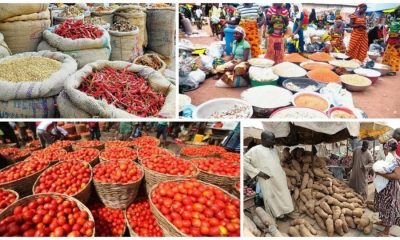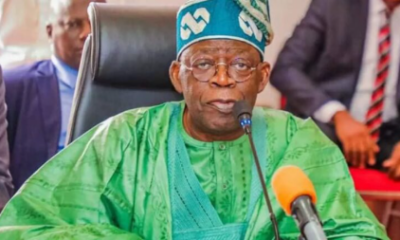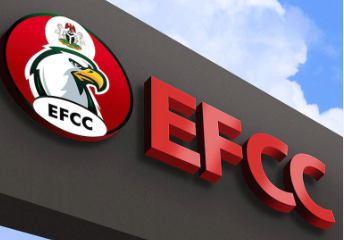Business
Hard times awaits manufacturers in 2016
Published
10 years agoon
By
Olu Emmanuel
…as CBN’s forex restrictions, policies bite harder
By Odunewu Segun
With 9.4 per cent inflation rate recorded in the final quarter of 2015, the naira is facing the highest level of volatility in its over 50 year’s history of existence. It was not only devalued by 35 per cent in the last 14 years, but in 2001 alone, its value was slashed 27 per cent, followed by an eight per cent cut in the last part of the final quarter of 2015.
According to the National Bureau of Statistics (NBS), Nigeria exports plunged in the third quarter from a year ago and imports also fell, as currency controls introduced by the CBN start to bite.
The balance of trade in the third quarter was N645 billion, down from N2.87 trillion in the third quarter a year ago. Exports fell by 50.3 per cent in the third quarter from a year ago and imports declined 7.3 per cent, the NBS said. The fall in crude oil exports, which accounted for 69.1 per cent of total domestic exports this year, hit the economy the most.
“The sharp decline in exports and slight decrease in imports contributed to a continued fall in the country’s trade balance, by 32 per cent,” the NBS said.
Managing Director of Financial Derivatives Ltd, Bismark Rewane, explains why the naira is on the downside. “As oil prices dipped, the Central Bank of Nigeria (CBN) has prioritised stability of exchange rate in the official market. It has drawn an exclusion list of avoidable imports from being funded in the official market. With the foreign exchange demand for the items transferred to the parallel market, rates in that market have soared”.
Rewane believes that besides the dwindling crude oil prices and reduced forex earnings, the decision by the CBN to peg the naira in the official market, resist further devaluation, lower interest rates and increase credit to the real sector, has heightened the exchange rate crisis.
Although pundits’ debate whether the naira is overvalued or undervalued, the real issue is that the CBN’s control of the local currency prevents it from being responsive to economic fundamentals.
“While every economy is controlled in some way, the CBN’s refusal to allow the exchange rate and other relative prices adjust to terms of trade shocks, seems to be disrupting the country’s fundamental economic structure,” Rewane said.
To him, the sharp decline in oil prices has created trade shocks experienced by many oil producing countries and this has led to the readjustment of most emerging market currencies. “The naira is overvalued at its current official exchange rate of N199 by about 12 per cent. The CBN insists on pegging the naira at this rate despite slowing economic growth, reduced forex earnings, dwindling oil prices, depleting external reserves and increasing inflationary pressures,” he said.
But, this is not the first time Nigeria has suffered from an overly controlled currency. From 1981 to 1985, during a similar period of control and oil shocks, relative prices did not adjust to restore internal and external balances. This led to low production, economic distortions, massive retrenchment and poverty.
In contrast, from 1986 to 1991, when the Structural adjustment Programme (SAP) was introduced, the exchange rate was flexible. Economic data showed that there was increased output, better employment figures and less poverty. Both periods had negative oil price shocks.
Other economists insist that Nigeria’s current managed floating exchange rate regime combines features of both the fixed and flexible exchange rate. They explain that a lightly managed floating exchange rate regime is advocated given that the exchange rate becomes determined essentially by demand and supply forces, while allowing the CBN to intervene occasionally to moderate excessive fluctuations, which are prone in developing countries, including Nigeria.
Analysts insist that with the exchange rate at the parallel market depreciating to as low as N280 to a dollar, it may be time for the CBN to take another look at its stance on the exchange rate management.
Pundits forecast that should oil prices fall below $30 per barrel, an exchange rate adjustment would be inevitable and given the current macroeconomic headwinds, a lightly managed floating exchange rate policy may be more suitable for the naira to regain its lost glory.
The CBN had imposed some currency control measures to save the naira. In June, it curbed access to the interbank currency market for importers bringing in a variety of goods. In an effort to conserve its dollar reserves, the bank said importers could no longer get hard currency to buy 41 items, ranging from toothpicks and rice to steel products and private jets.
This same restriction on foreign currency forced commercial banks’ to place a restriction on the use of ATM cards abroad by their customers. The apex bank which admits it has no powers to reverse the banks’ decision on the use of the ATMs abroad, has thrown its weight behind the commercial bank’s position. According to it, it would assist in reducing the pressure on the naira.
CBN’s Director, Monetary Policy Department, Moses Tule, explained that the restriction might continue until the country’s forex earnings improved. He hinted that if banks had not taken the decision to restrict the use of ATM cards abroad, some of them would have been experiencing challenges meeting the demand of their overseas’ customers.
The Managing Director, Afrinvest West Africa Plc, Ike Chioke, believes the incorporation of a long-term diversified strategy in fiscal policy is required to cushion shocks in various segments of the economy.
For him, the persistent pressure on the naira could have been minimised if a counter fiscal policy had been developed, as the CBN cannot continue to defend the naira with foreign reserves.
“To reduce this pressure, an inward looking policy (tax incentives, infrastructure development and production subsidy) should be emphasised to reduce the dependence on imported goods”, he said.
He explained that asides from oil receipts, the development of the Agricultural sector will in the short term reduce the forex burden of food imports and on the long run, enhance foreign receipts if its comparative advantage in the sector is efficiently deployed.
But, an executive of the Nigerian Export-Import Bank, Chinedu Moghalu, said the sharp rises in the dollar exchange rate have been in the parallel market as the volatility has not been allowed to extend to the official market where the most economically important transactions are funded. “Although the dollar exchanged for N280 at the BDC in the week before Christmas, and even retreated immediately, by the way – at the official market, the dollar has continued to exchange at N199 to dollar since March,” he said.
For him, the CBN has taken a position – backed by the administration of President Muhammadu Buhari – which is to protect the official market from speculation and damaging devaluation.
“But the reality is that, as a people, we have to make adjustment in our tastes. Not only should we be ready to replace foreign products with local substitutes; we must be prepared to let go of some exotic products, even where there is no direct alternative. It is part of the demand of building a virile country and a sustainable economy,” he said.
You may like


Nigeria’s inflation eases in July as food harvest, base effect drive decline


Dangote refinery’s new fuel distribution scheme targets inflation, Job creation


Appeal Court nullifies Emefiele’s asset forfeiture, Orders retrial


Naira gains 1.28% in official market in May amid oil price risks, currency volatility


Tinubu: Diaspora APC chieftain tasks local banks on reforms


Alleged corruption: EFCC witness details wow Emefiele allegedly received $17.1 million in cash
Trending

 Health5 days ago
Health5 days agoDeclassified CIA memo explored concealing mind-control drugs in vaccines

 Entertainment6 days ago
Entertainment6 days agoSimi addresses resurfaced 2012 tweets amid online backlash

 Crime5 days ago
Crime5 days agoSenior police officers faces retirement after Disu’s appointment as acting IGP

 Education7 days ago
Education7 days agoPeter Obi urges JAMB to address registration challenges ahead of exams

 Health7 days ago
Health7 days agoNAFDAC issues alert on suspected revalidated SMA Gold infant formula

 Comments and Issues6 days ago
Comments and Issues6 days ago20 Critical Fixes to Save Nigeria’s Democracy from Electoral Fraud

 Football6 days ago
Football6 days agoMartínez ruled out of Everton clash with calf injury

 Latest6 days ago
Latest6 days agoICPC yet to respond to El-Rufai’s bail request as arraignment date looms

